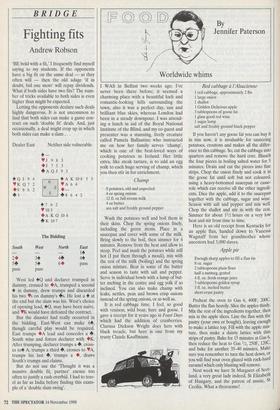I WAS in Belfast two weeks ago. I've never been
there before; it seemed a charming place with a beautiful loch and romantic-looking hills surrounding the town, also it was a perfect day, sun and brilliant blue skies, whereas London had been in a steady downpour. I was attend- ing a lunch in aid of the Royal National Institute of the Blind, and my co-guest and presenter was a stunning, lively creature called Pamela Ballantine who instructed me on how her family serves 'champ', which is one of the best-loved ways of cooking potatoes in Ireland. Her little extra, like steak tartare, is to add an egg yolk to each huge serving of champ, which you then stir in for enrichment.
Champ 8 potatoes, old and unpeeled
4 oz spring onions 12 fl. oz full-cream milk 4 oz butter
sea salt and freshly ground pepper Wash the potatoes well and boil them in their skins. Chop the spring onions finely, including the green stems. Place in a saucepan and cover with some of the milk. Bring slowly to the boil, then simmer for 4 minutes. Remove from the heat and allow to steep. Peel and mash the potatoes while still hot (I put them through a mouli), mix with the rest of the milk (boiling) and the spring onion mixture. Beat in some of the butter and season to taste with salt and pepper. Serve in individual bowls with a lump of but- ter melting in the centre and egg yolk if so inclined. You can also make champ with leaks, nettles, peas and brown crisp onions instead of the spring onions, or as well as.
It is red cabbage time, I feel, so good with venison, wild boar, hare and goose. I gave a receipt for it years ago in Feast Days which had the addition of cranberries. Clarissa Dickson Wright does hers with black treacle, but here is one from my trusty Claude Kauffmann. Red cabbage a l'Alsacienne 1 red cabbage, approximately 2 lbs
1 large onion 1 shallot 1 Golden Delicious apple 3 tablespoons of goose fat 1 glass good red wine 1 sugar lump salt and freshly ground black pepper
If you haven't any goose fat you can buy it in tins now, it is invaluable for sauteeing potatoes, croutons and makes all the differ- ence to this cabbage. So, cut the cabbage into quarters and remove the hard core. Blanch the four pieces in boiling salted water for 5 minutes. Drain and cut the pieces into fine strips. Chop the onion finely and cook it in the goose fat until soft but not coloured, using a heavy-bottomed saucepan or casse- role which can receive all the other ingredi- ents. Dice the apple, add it to the saucepan together with the cabbage, sugar and wine. Season with salt and pepper and mix well. Chop the shallot and stir in with the rest. Simmer for about 11/2 hours on a very low heat and stir from time to time.
Here is an old receipt from Kentucky for an apple flan, handed down to Vanessa Wagstaff from her grandmother whose ancestors had 3,000 slaves.
Apple pie
Enough sharp apples to fill a flan tin 8 oz. sugar 2 tablespoons plain flour half a nutmeg, grated 4 fl. oz. fresh orange juice 3 tablespoons golden syrup 3 fl. oz. melted butter short-crust pastry
Preheat the oven to Gas 6, 400F, 200C. Butter the flan heavily. Slice the apples thinlY. Mix the rest of the ingredients together, then mix in the apple slices. Line the flan with the pastry (your own or bought), leaving enough to make a lattice top. Fill with the apple mix- ture, then make a dainty lattice with thin strips of pastry. Bake for 15 minutes at Gas 6, then reduce the heat to Gas 1/2, 250F, 120C, and bake for another 35-40 minutes. Make sure you remember to turn the heat down, or you will find your oven glazed with rock-hard caramel which only blasting will remove. Next week we have St Margaret of Scot- land, a very great lady indeed, St Elizabeth of Hungary, and the patron of music, St Cecilia. What a threesome!


















































































 Previous page
Previous page